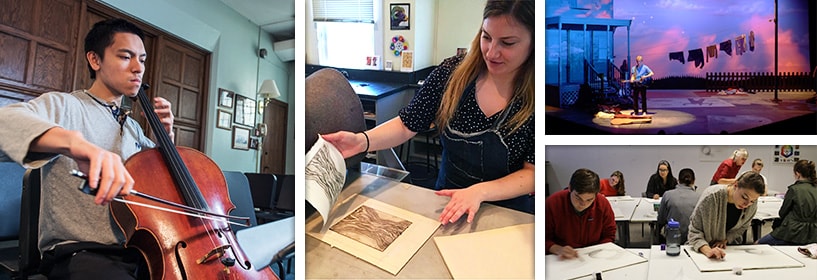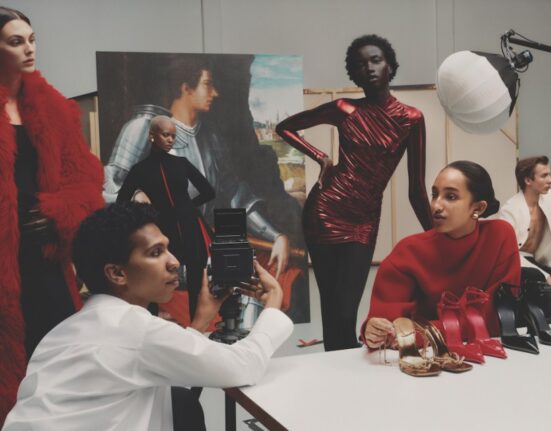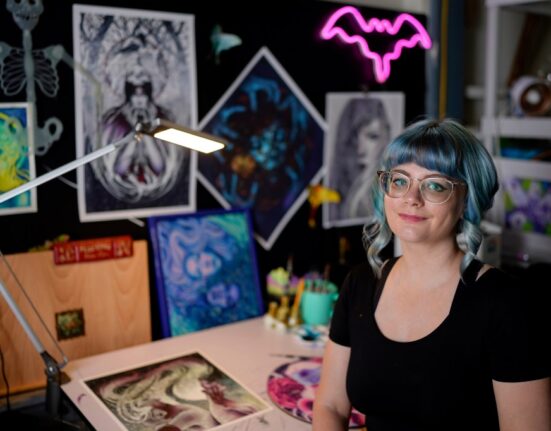
The Department of Visual & Performing Arts at Loyola University Maryland offers a
major in visual arts with concentrations in art history, photography, studio arts, or interarts; and a major in performing arts with concentrations in music, theatre, or a comprehensive concentration (combination of music and theatre). Minors are
offered in art history, photography, studio arts, interarts, music, and theatre.
Department Chair: Jon Malis (he/him/his), jdmalis@loyola.edu, 410-617-2566
Curated Curriculum
Each one of the programs in the department provides its students with a rigorous and
comprehensive curriculum designed to first introduce students to the discipline and
then develop increasing levels of mastery of the knowledge, skills, and habits of
the field. Introductory level courses present the basic foundation in each discipline
with no previous experience necessary. Upper division courses offer more specialized
studies, ordinarily building upon the experiences of the introductory classes. Advanced
students may apply for an internship or undertake an independent study in their specific
discipline. Additionally, all Loyola undergraduates choose one visual or performing
arts course as an integral part of the core curriculum.
Facilities for Flourishing
All Visual & Performing Arts programs are located in the Julio Fine Arts wing of the
DeChiaro College Center, which houses not only the University’s McManus Theatre and
Julio Fine Arts Gallery, but also rehearsal rooms for the performing arts, specialized
classrooms for art history, and fully-equipped studios for clay, drawing, and photography.
Specialized spaces such as sound-proof practice and piano rooms, a clay green room,
black-and-white and alternative-process darkrooms, digital laboratories, an electronic
music studio, and a “black box” theatre are also a part of the facilities. Other on-campus
spaces include both painting and printmaking studios.
Extracurriculars Abound
Department-sponsored field trips to museums, galleries, and professional performances
in Baltimore and other cities expose visual & performing arts students to creative
works by practicing artists, performers, critics, and curators. Each semester students
will find performance opportunities in any of a number of performing ensembles including:
the Evergreen Players, the Poisoned Cup Players, the Spotlight Players, Jazz Ensemble,
Jazz Combo, Steel Pan Ensemble, Chamber Ensemble, the Concert Choir, and Cantorei.
Students in the visual arts can avail themselves of on- and off-campus exhibition
venues, while art history students benefit from internship opportunities in Baltimore’s
museums. The Sehn Fund—made possible by a generous gift from the Sehn family—supports
a wide range of artistic and intellectually enriching experiences for students in
art history, photography, and studio arts. This gift has enabled the department to
support a series of guest lecturers and visiting artists and has also financed student
attendance at the College Art Association annual conference in Washington, D.C.
Interdisciplinary Majors
Interdisciplinary majors allow students to combine interests in two different disciplines,
enabling students to individualize their curriculum and help prepare them for our
interdisciplinary world.
Visual Arts
Disciplines recently combined with visual art in this way include biology, classics,
communication, English, history, and writing. It is possible, however, to combine
the visual arts with any other discipline participating in Loyola’s interdisciplinary
studies program. The visual arts requirements for an interdisciplinary major are as
follows:
- PT 270 or SA 224 or SA 227
- AH 109 or AH 110 or AH 111
- AH 350 or PT 350 or SA 350
- SA 225 or 300-level course in AH, PT, or SA
- 300-level or 400-level course in AH, PT, or SA
- 300-level or 400-level course in AH, PT, or SA
- 300-level or 400-level course in AH, PT, or SA
- AH 400-level or PT 400/SA 400 Senior Capstone for Artists (in consultation with program
advisor)
Double Major Possibilities
In addition to the major, the following are a few double major options for students
interested in Visual & Performing Arts.
- Any of the Visual & Performing Arts majors with any Humanities major
- Any of the Visual & Performing Arts majors with Writing, Modern Languages, or Communication
- Any of the Visual & Performing Arts majors with any Social Science major
(The above can generally be completed with no additional courses above the required
40 for graduation. This, of course, takes planning, but it is possible to fit a double
major in without taking a 6th course in any given semester.)
- Any Visual & Performing Arts major with a Secondary Education minor – leading to certification to teach in middle and high schools. There may be a need
for an extra course or two depending on Math and Foreign Language placement; planning
is critical, but it is very doable. - Any Visual & Performing Arts major with Biology, Chemistry, or Physics would necessitate somewhere between 4 and 6 extra courses over the 8 semesters. This
is a variable number, as it does not take into account AP credit, math placement,
and foreign language placement – all of which may reduce the number of courses needed
to fulfill any particular major. - Any Visual & Performing Arts major with Business – students would have from 4 to 6 available free slots for the Visual & Performing Arts
major, meaning that for approximately 6 semesters, a 6th course would be necessary; again, this is not taking into account placements.






